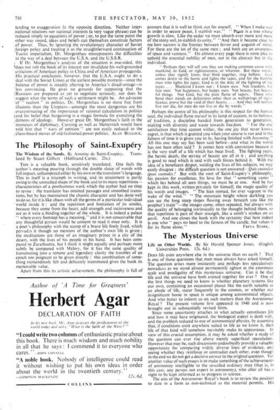The Philosophy of Saint-Exupery
The Wisdom of the Sands. By Antoine de Saint-Exupery. Trans- lated by Stuart Gilbert (Hollisand Carter. 21s.)
THIS is a valuable book, sensitively translated. One feels the author's meaning pouring through the double sluice of words with full impact, unhampered either by his own or the translator's language. This in itself is a triumph in writing, and its attainment is partly owing to the unstudied shape of the book and to its many repetitions— characteristics of a posthumous work which the author had no time to revise : the translator has omitted passages and smoothed transi- tions, but he has maintained the chaotic character and has done well to do so, for it is like chaos with all the germs of a particular individual -world inside it : and the repetition and limitation of its similes, because they come from the heart, add strength and incisiveness and are as it were a binding together of the whole. It is indeed a palace " where every footstep has a meaning," and it is not conceivable that any thoughtful parson would be content to read it once only. It is a poet's philosophy with the stamp of a brave life finely lived, which pervadas it though no mention of the author's own life is given ; the meditations are those of an imaginary prince in a city of the desert, with the lives of his people in his hand. It has been com- pared to Zarathustra, but I think it might equally and perhaps more subtly be compared with M-alory, for it has the same quality of transmuting into a remote and legendary clarity the troubles of an epoch too poignant to be given directly : this combination of some- thing tremendously felt and delicately transmuted gives the book its memorable value.
Apart from this its artistic achievement, the philosophy is full of
answers that it is well to think out for oneself. " When I make war in order to secure peace, I stablish war." " Peace is a tree whose growth is slow. Like the cedar we must absorb ever more and more of the stony soil, to stablish its unity." "And then it became clear to me how narrow is the frontier between fervor and anguish of mind. For these are the lot of the same men ; and both are an awareness of space and vastness." On almost every page there is some plea to uphold the essential nobility of men, not in the abstract but in the individual.
" Perhaps they will tell you they are making common cause with
mankind, or God, or righteousness, or whatnot. But these words, unless they signify knots that' bind together, ring hollow. God comes down to the home and lights the taper, and for the humble man who lights his taper, God is in the duty of the lighting of the taper.... Mankind I know not ; I know men. Not freedom, but free men. Not happiness, but happy men. Not beauty, but beauti- ful things. Not God, but the pure flame of tapers. Those silo bend their minds on definitions other than as wellsprings of signi- ficance, prove but the void of their hearts. . . .- And they will neither live nor die, for men do not live or die by words."
Perhaps the centre of his philosophy is this respect for the human soul, the individual flame nursed in its lamp of custom, in its holiness of tradition, a discipline handed from generation to generation, making with diversity and waste towards freedom. " For the one satisfaction that time cannot wither, the one joy that never knows regret, is that which is granted you when your course is run and in the fulness of time it is given you to be, having finished with becoming." All this one may say has been said before—and what in the world has not been often said ? It comes here with conviction because it is the very stuff of a life which has been lived. The fighting years, the heroic death, the service of beauty are all in it ; and anything is good-to read which is said with such forces behind it. With the idea of a beneficent despot, welding the lives of his subjects, we may easily disagree : the difficult question is not answered—Qitis custodies ipsos custodes? But with the root of Saint-Exupery's philosophy, his passion for excellence; his love for that " something vaster " which lies behind all seen things, we must be at one. And he has kept in this work, written privately for himself, the magic quality of his words and images. " The lean nomad, for ever vagrant in the wake of the wind." " The mountain height where darkling you can see the long steep slopes flowing away beneath you like the prophet's train"—the images come, often repeated, but always with the quality of belonging intrinsically to the thought behind them, so that repetition is part of their strength, like a smith's strokes on an anvil. And one closes the book with the certainty that here indeed is one who " pays no heed to the fatness of the candle, but values it










































 Previous page
Previous page